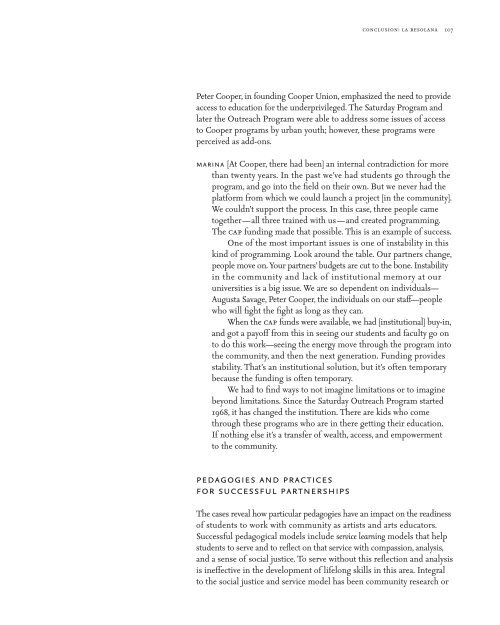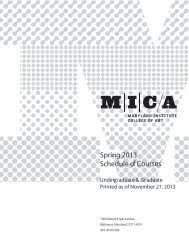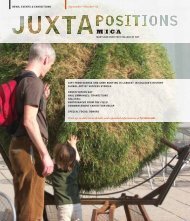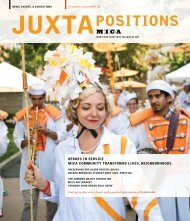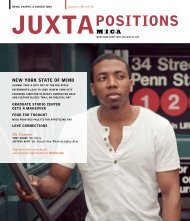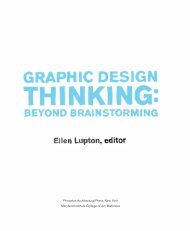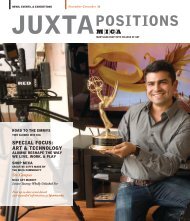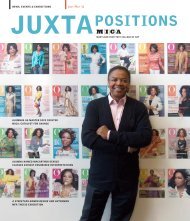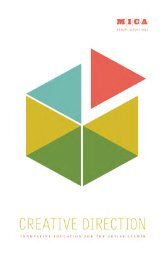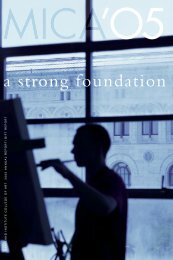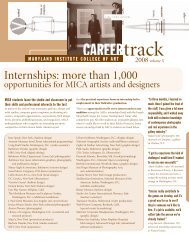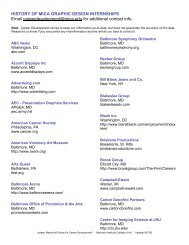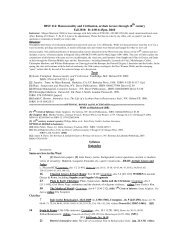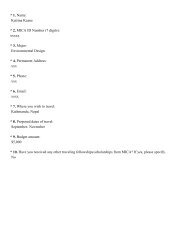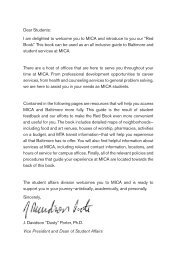art/vision/voice - Maryland Institute College of Art
art/vision/voice - Maryland Institute College of Art
art/vision/voice - Maryland Institute College of Art
You also want an ePaper? Increase the reach of your titles
YUMPU automatically turns print PDFs into web optimized ePapers that Google loves.
Peter Cooper, in founding Cooper Union, emphasized the need to provide<br />
access to education for the underprivileged. The Saturday Program and<br />
later the Outreach Program were able to address some issues <strong>of</strong> access<br />
to Cooper programs by urban youth; however, these programs were<br />
perceived as add-ons.<br />
marina [At Cooper, there had been] an internal contradiction for more<br />
than twenty years. In the past we’ve had students go through the<br />
program, and go into the field on their own. But we never had the<br />
platform from which we could launch a project [in the community].<br />
We couldn’t support the process. In this case, three people came<br />
together—all three trained with us—and created programming.<br />
The cap funding made that possible. This is an example <strong>of</strong> success.<br />
One <strong>of</strong> the most important issues is one <strong>of</strong> instability in this<br />
kind <strong>of</strong> programming. Look around the table. Our p<strong>art</strong>ners change,<br />
people move on. Your p<strong>art</strong>ners’ budgets are cut to the bone. Instability<br />
in the community and lack <strong>of</strong> institutional memory at our<br />
universities is a big issue. We are so dependent on individuals—<br />
Augusta Savage, Peter Cooper, the individuals on our staff—people<br />
who will fight the fight as long as they can.<br />
When the cap funds were available, we had [institutional] buy-in,<br />
and got a pay<strong>of</strong>f from this in seeing our students and faculty go on<br />
to do this work—seeing the energy move through the program into<br />
the community, and then the next generation. Funding provides<br />
stability. That’s an institutional solution, but it’s <strong>of</strong>ten temporary<br />
because the funding is <strong>of</strong>ten temporary.<br />
We had to find ways to not imagine limitations or to imagine<br />
beyond limitations. Since the Saturday Outreach Program st<strong>art</strong>ed<br />
1968, it has changed the institution. There are kids who come<br />
through these programs who are in there getting their education.<br />
If nothing else it’s a transfer <strong>of</strong> wealth, access, and empowerment<br />
to the community.<br />
pedagogies and practices<br />
for successful p<strong>art</strong>nerships<br />
conclusion: la resolana 107<br />
The cases reveal how p<strong>art</strong>icular pedagogies have an impact on the readiness<br />
<strong>of</strong> students to work with community as <strong>art</strong>ists and <strong>art</strong>s educators.<br />
Successful pedagogical models include service learning models that help<br />
students to serve and to reflect on that service with compassion, analysis,<br />
and a sense <strong>of</strong> social justice. To serve without this reflection and analysis<br />
is ineffective in the development <strong>of</strong> lifelong skills in this area. Integral<br />
to the social justice and service model has been community research or


